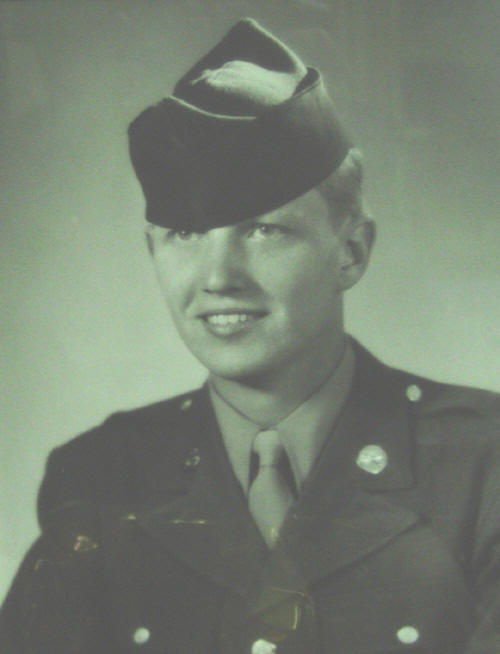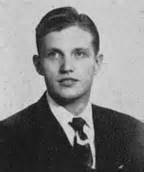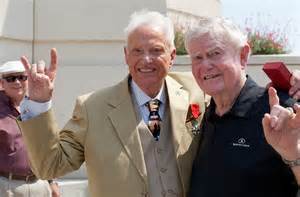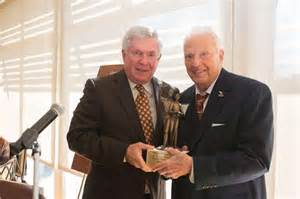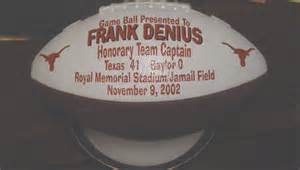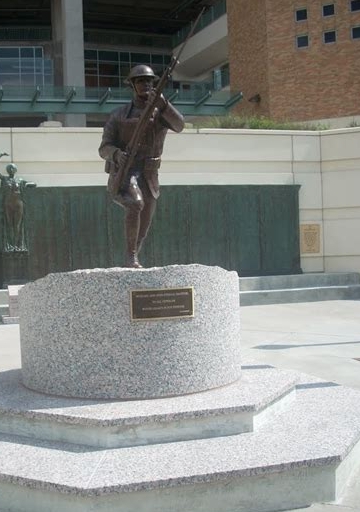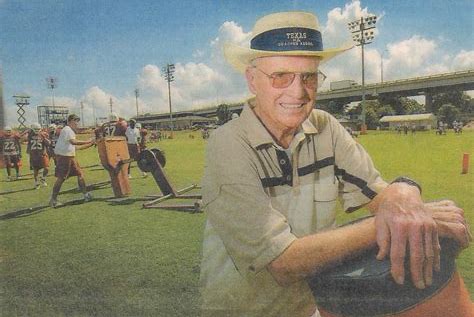Frank Denius passed away on July 29th 2018
The information to order Frank's book is below
Phone: 800-252-3206 or 512-471-7233
Fax: 512-232-7178
Email: info@utpress.utexas.edu
Mail:
University of Texas Press
P.O. Box 7819
Austin, TX 78723
United States
Frank Denius, true hero and Consummate Longhorn
By Milton Carr (Adjutant, Texas Capital Chapter 1919, The Military Order of the Purple Heart, Austin, Texas). He was one of the ten most decorated soldiers involved in the European Theater and the D-Day Invasion in World War II. Frank was a long-time supporter of the Longhorn football team, and in honor of his support, the Texas Longhorns' special teams are called "The Special Forces." Every time the Longhorns practice, they do so at the practice facility named in his honor. Denius is a Distinguished American celebrated by the Greater Austin Chapter of the College Football Hall of Fame, and he was chairman of the Darrell K Royal-Texas Memorial Stadium Veterans Committee. This is his story.
Frank Denius thru the years
Franklin W. Denius spent his early childhood in Athens, Texas, where his family lived and attended public schools. As a young teenager, he went off to military prep school, Schreiner Institute in Kerrville. He graduated in 1942 and then enrolled, as a member of the Army Program for 17-year-olds, at the Citadel in Charleston, S.C. After two semesters, he enlisted in the Army and entered active duty on June 3, 1943. Pvt. Denius, after basic artillery training, was assigned to the 30th Infantry Division.
... in Belgium during the Battle of the Bulge, his forward observer party was again supporting the infantry battalion. On December 22, 1944, they found themselves in the path of a German Panzer attack. Their artillery observation post was discovered by the enemy and taken under fire by German tanks despite the fire that began to fall all around him, Sgt. Denius refused to withdraw from the post and continued "rendering artillery support" until the attack had been repulsed. Staff Sgt. Franklin W. Denius later received his third award (second oak leaf cluster) of the Silver Star. He was still a teenager at the time. Frank was wounded in Normandy, wounded again during the Battle of the Bulge, and was awarded his second Purple Heart in February 1945. After serving with his unit in the Normandy, Northern France, Rhineland, Ardennes-Alsace, and Central Europe campaigns through to the end of the war in Europe, Frank Denius returned home with the 30th Infantry Division. He arrived in the United States on August 25, 1945, and proceeded back to Texas, where he was discharged in San Antonio at Fort Sam Houston on October 2. A fourth Silver Star was awarded to Frank after the war was over in 1945.
After leaving the Army, he enrolled at The University of Texas, and he has made his home in Austin ever since. Frank graduated in 1949, a big year for him. He earned degrees in both business and law; was admitted to the State Bar of Texas; went to work for the Austin law firm of Looney, Clark, and Moorhead; and became a director in the Cain Foundation (established by his uncle, Wofford Cain, a 1913 Texas A&M graduate and former A&M regent). That year, too, he married Charmaine Hooper, who was also from Athens, Texas.
But nowhere is his involvement more apparent than it is with the University of Texas football. He goes to all the home games and most of the away games. He faithfully attends all the football practices, which once prompted Coach Mack Brown to say, "He's made more practices than I have."
Frank is a life member of the Military Order of the Purple Heart, Chapter 1919. "In glory and with eternal gratitude to all veterans whose legacy is our freedom." -- Frank Denius
Frank Denius' contributions to Longhorn sports history represent a portal to the past reminding Longhorn fans that heritage shapes the present and empowers the future.
07.29.2018 | Football
In Memoriam: Frank Denius
Legendary Longhorn supporter and American hero passed away at the age of 93.
Images added to Bill Little's article about Frank were added by Billy Dale.
At a post-game press conference when Darrell Royal was coaching the Longhorn football team, a sportswriter asked him about the importance of the team of a particular player who had been injured.
"How much will your team miss him?" the writer asked.
Darrell Royal paused for a moment, and then he said this:
"How long is a piece of rope?"
The point was, some things are immeasurable.
That quote came to mind when we learned of the death of Frank Denius.
How much did Frank mean to all of us?
"How long is a piece of rope?"
Frank Denius, who died Sunday at the age of 93, was simply the most loyal friend, committed Longhorn football fan, and — most of all — American patriot to ever come into our lives.
He believed in football because he believed in the spirit of the game and what it taught young kids. He celebrated the victories, hated the defeats, and was always ready to strap on his boots for one more march to the next game.
Unlike some who would call a football game a "battle," Frank understood that it was a game. An outstanding game, but a game all the same. Born on January 4, 1925, in Athens, Texas, Frank was the definition of a life well-lived, and he knew the difference between a game and a battle. A 1949 UT graduate, he loved his university and his country more than any person I ever knew.
That is why he could meld pride and emotion into humility and graciousness. He gave much more than he received; he was a builder who loved people. We loved Frank because he loved us.
Folks said he was the 10th most decorated soldier in the European theater of World War II. And he attended more Longhorn football games and practices than any coach in a span that lasted more than 70 years from the 1940s through last season.
Through his family's Cain Foundation, Frank was the driving force behind millions of dollars given to his alma mater, UT-Austin, and Texas A&M University, where his grandfather was once a member of the Board of Regents.
As a lawyer, he was a pivotal force in the defining moments of integration of athletics at UT in the 1960s. As a benefactor, he was one of the founders of the Greater Austin Chapter of the College Football Foundation and College Hall of Fame, among the many organizations in which he participated.
When Texas Memorial Stadium was undergoing various transformations through the years, it was Frank who stood sentinel, making sure that the original purpose of the stadium — to honor those Texans who died in World War I — were honored. And it was Frank, working with Coach Royal, who maintained that integrity as the newest version became Darrell K Royal-Texas Memorial Stadium in 1996.
Outside of a highly-trafficked corner of the stadium where his beloved Longhorns played, a dream was realized with the creation of the Frank Denius Memorial Plaza. The display outside the northwest corner of the stadium is complete with the inclusion of a statue of a World War I vintage "doughboy," along with the stadium's original tablet of tribute. All along, he rarely missed a football game. Oh, he did take a night off when the Congressional Medal of Honor Society presented him with a Patriot Award, but for the most part, he headed to Longhorn games, both home and away. At first, it would be on a party bus with his wife and friends such as Noble Doss, Wally Scott, Don Weedon, Rooster Andrews, and an elite collection of citizens of Austin, and storied Longhorns of the past. One by one, they have gone away. Then, it became a road trip with the Texas Exes and the Longhorn band, with Ted Koy and his wife Valerie often picking him up at 4 a.m. for a flight to places like Ames, Iowa, and Manhattan, Kansas. Frank was there in Pasadena when Mack Brown's Longhorns helped him celebrate his 81st birthday with the BCS National Championship in January of 2006. But then, it seemed, Frank was always there. Others would tell his story — how he hit Normandy Beach in June of 1944 as part of the Allied Forces which came to liberate Europe from the Nazis — and how, year after year, he would take a pilgrimage back there to remember. Frank's story and his presence were long an inspiration to the UT teams, coaches, and staff he supported. During the Mack Brown era, in his honor and as a tribute to our military, the Longhorns' special teams became known as the Special Forces, and Texas' Most Valuable Special Teams Player was named in his honor. You can throw out all the clichés when it comes to Frank. He was indeed "larger than life." He was "a giver, not a taker." He was a friend who would stand at the practice fields, which bore his name and learn about decades of Longhorn players. He would know their names, as well as their parents' names, where they were from, and their stories. If you needed advice, he had it. If you needed a friend or a shoulder to lean on, he was there. Most of all, he was a true American hero who served well as a member of "The Greatest Generation."
And in that space, he, like the others, should be remembered not only for what they did but for who they were. Gradually, we are losing them, and we are left to honor their legacy and share and remember their impact. That is why it is impossible to define Frank Denius. He was too big to quantify. There will be a massive void at the Frank Denius Practice Fields when the Longhorns begin practice for the 2018 season on August 3, and he will be missed as Texas heads to Washington D.C. to face Maryland on September 1. How much did he matter, and how much will we miss him? How long is a piece of rope? Bill Little




